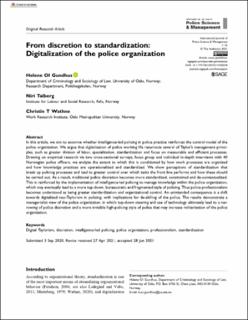| dc.contributor.author | Gundhus, Helene Ingebrigtsen | |
| dc.contributor.author | Talberg, Olav Niri | |
| dc.contributor.author | Wathne, Christin Thea | |
| dc.date.accessioned | 2021-09-29T14:20:15Z | |
| dc.date.available | 2021-09-29T14:20:15Z | |
| dc.date.created | 2021-08-31T14:19:18Z | |
| dc.date.issued | 2021-08-11 | |
| dc.identifier.citation | International Journal of Police Science and Management. 2021, 1 (15), . | en_US |
| dc.identifier.issn | 1461-3557 | |
| dc.identifier.issn | 1478-1603 | |
| dc.identifier.uri | https://hdl.handle.net/11250/2786092 | |
| dc.description.abstract | In this article, we aim to examine whether intelligence-led policing in police practice reinforces the control model of the police organization. We argue that digitalization of police working life resurrects several of Taylor’s management principles, such as greater division of labor, specialization, standardization and focus on measurable and efficient processes. Drawing on empirical research via two cross-sectional surveys, focus group and individual in-depth interviews with 40 Norwegian police officers, we analyze the extent to which this is conditioned by how work processes are organized and how knowledge practices are operationalized and standardized. We show perceptions of standardization that break up policing processes and lead to greater control over which tasks the front line performs and how these should be carried out. As a result, traditional police discretion becomes more standardized, constrained and de-contextualized. This is reinforced by the implementation of intelligence-led policing to manage knowledge within the police organization, which may eventually lead to a more top-down, bureaucratic and fragmented style of policing. Thus police professionalism becomes understood as being greater standardization and organizational control. An unintended consequence is a shift towards digitalized neo-Taylorism in policing, with implications for de-skilling of the police. The results demonstrate a managerialist view of the police organization, in which top-down steering and use of technology ultimately lead to a narrowing of police discretion and a more invisible high-policing style of police that may increase militarization of the police organization. | en_US |
| dc.description.sponsorship | This work was supported by the Norwegian Research Council grant: 238170 ‘New Trends in Modern Policing’ and grant: 313626 ‘Algorithmic Governance and Cultures of Policing: Comparative Perspectives from Norway, India, Brazil, Russia, and South Africa’. | en_US |
| dc.language.iso | eng | en_US |
| dc.publisher | SAGE Publications | en_US |
| dc.relation.ispartofseries | International Journal of Police Science and Management; | |
| dc.rights | Navngivelse 4.0 Internasjonal | * |
| dc.rights.uri | http://creativecommons.org/licenses/by/4.0/deed.no | * |
| dc.subject | Digital Taylorism | en_US |
| dc.subject | Discretion | en_US |
| dc.subject | Intelligence-led policing | en_US |
| dc.subject | Police organizations | en_US |
| dc.subject | Professionalism | en_US |
| dc.subject | Standardization | en_US |
| dc.title | From discretion to standardization: Digitalization of the police organization | en_US |
| dc.type | Peer reviewed | en_US |
| dc.type | Journal article | en_US |
| dc.description.version | publishedVersion | en_US |
| dc.rights.holder | © The Author(s) 2021 | en_US |
| cristin.ispublished | true | |
| cristin.fulltext | original | |
| cristin.qualitycode | 1 | |
| dc.identifier.doi | https://doi.org/10.1177/14613557211036554 | |
| dc.identifier.cristin | 1930130 | |
| dc.source.journal | International Journal of Police Science and Management | en_US |
| dc.source.pagenumber | 15 | en_US |
| dc.relation.project | Norges forskningsråd: 238170 | en_US |
| dc.relation.project | Norges forskningsråd: 313626 | en_US |

